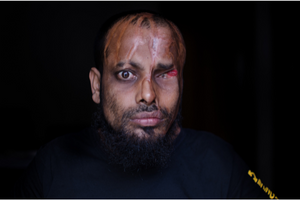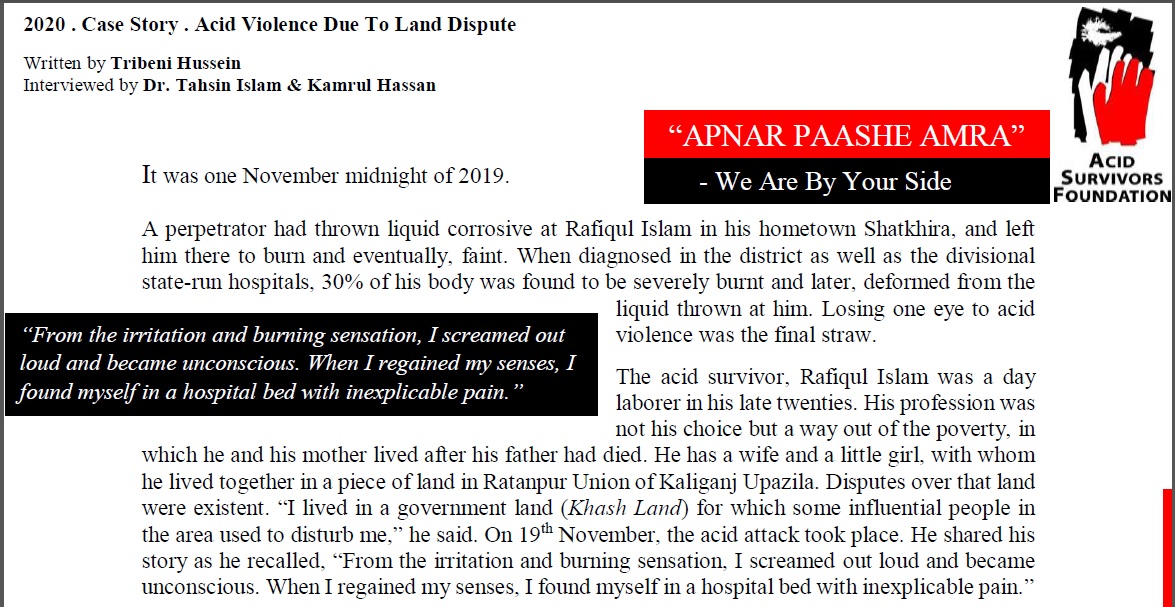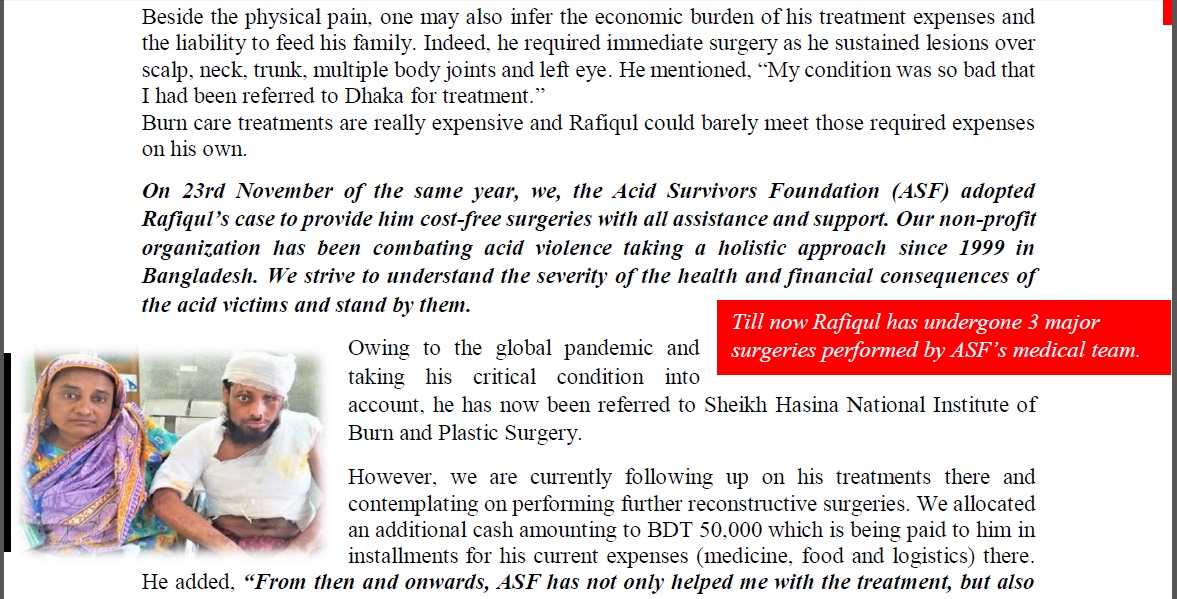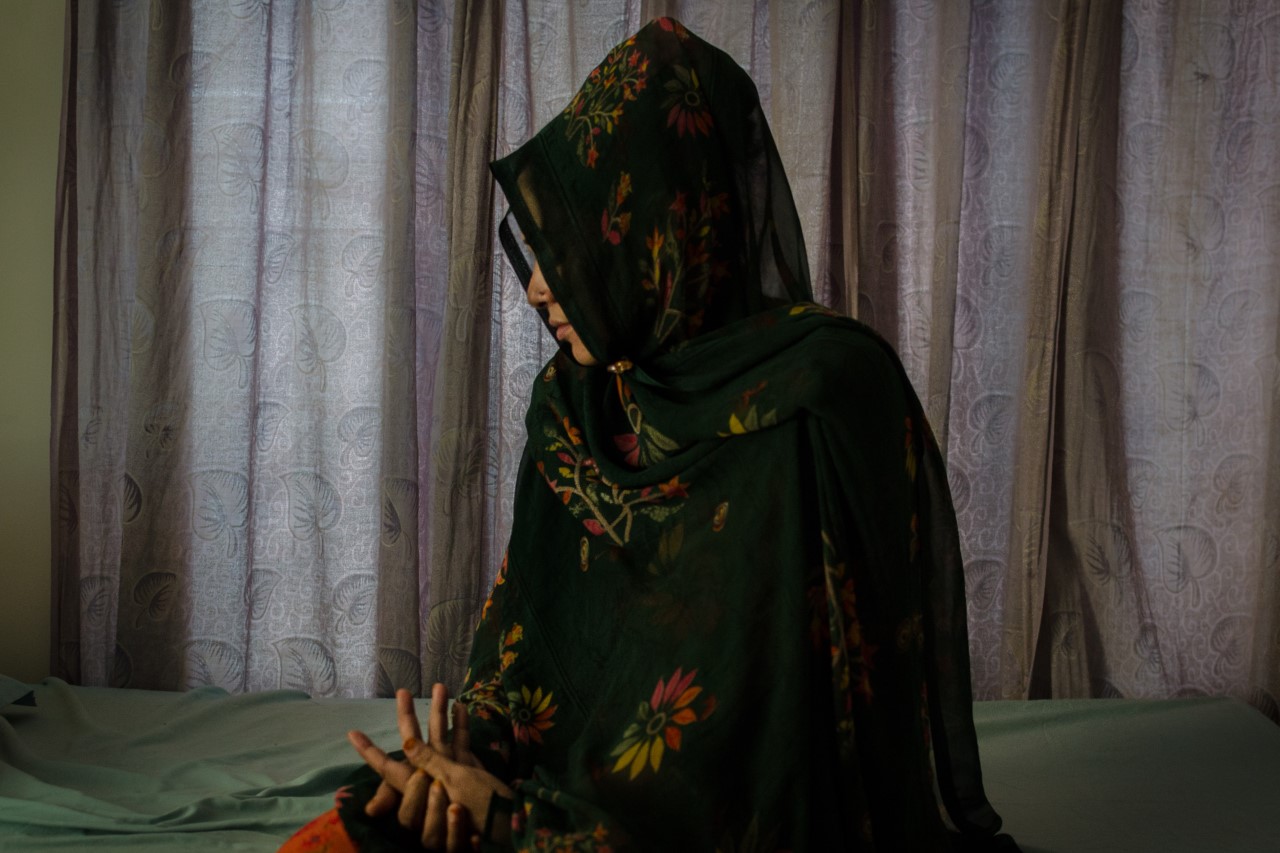
by ASF | Feb 1, 2022 | Survivors Story
Survivor still awaiting justice
Case Story – Tania Zaman
Date of incident: 17th Aug 2020
Name: Tania Zaman || Age: 26 || Place: Narail

26-years-old Tania lived harmoniously with her husband in Jessore and helped him in his business. She saved up to do something of her own one day. A year before the incident, Jewel, their neighbor, borrowed more than BDT 150K from Tania for doing business. He promised to repay the money in 3 months with interest. According to Tania, when asked to repay the following year, Jewel initially made excuses and then later threatened to kill her with acid.
Following the threat, Tania lodged a general diary (GD) in Narail Sadar police station. Quickly after, Jewel offered a village arbitration meeting (Shalish) to resolve the matter. Tania therefore made her way to her father’s place to meet Jewel but later made her way to her uncle’s place at night to see the GD copy first. As per Tania’s claims, it was during this time that Jewel and his accomplice Wahidur threw acid on her.
Tania was rushed to the Narail Sadar Hospital, where she was referred to Khulna Medical College & Hospital due to her debilitation condition. Later, ASF offered her outdoor treatment, legal counseling, assisted her family with cash, and referred her to the Sheikh Hasina Burn Institute for better treatment.
“The medical report contains incorrect information. I did not receive a clearance certificate at the end of my treatment. I had to request for a copy myself later”, lamented Tania. She further claimed that the information given in the final report were false and misinterpreted and so was the evidence collected from the crime scene on the basis of a forensic report which said that she poured acid on her body herself.
Meanwhile, Tania’s husband stopped communicating with her due to her in-laws’ influence and pressure from their local influential people. But Tania was headstrong on seeing her case through. She filed a Naraji petition in court and as the date of hearing pended, she fled from her hometown to Dhaka for her safety. There she first went to the Ministry of Home Affairs and later to the Prime Minister’s Office to drop applications demanding a re-investigation.
Over a year since the incident and Tania is still battling for justice. Her body still healing and her past yet to find closure. Tania believes there is light at the end of the tunnel. The journey of a legal battle in Bangladesh is often long and arduous, with justice unguaranteed. Justice unserved to survivors is an event of retraumatization for survivors. And justice taken too long to serve is justice unserved.
We, at ASF, stand in solidarity with Tania and have our doors open to survivors like her spanned across the country seeking legal advice and a chance to connect with panel lawyers.
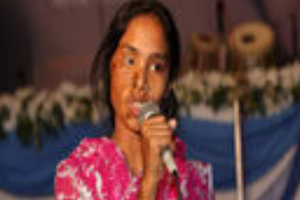
by ASF | Jan 12, 2020 | Survivors Story
Surma Begum with unusual resilience and recovery
Surma’s case is unique in the case files at ASF for her unusual resilience and tenacity in the face of extreme adversity. While many acid survivors come from poor socioeconomic conditions, Surma faced extreme poverty and neglect as a child. Her father left her and her mother when Surma was born, and two months later, after her mother remarried, Surma was mostly neglected and forced to survive off the charity of others. Attacked when she was only 15 years old in 2001, when she refused the romantic advances of a neighborhood boy, Surma’s prospects were even bleaker. Her chances to use marriage as a way to a better life were greatly diminished, as it was uncertain whether or not she would be able to find a husband who would be willing to overlook her disfigurement. Surma’s attacker left her with severe burns on the right side of her face, eye, and body, blinding her right eye. Due to the extreme nature of her burns, no one could anticipate how her life would commence, with untold numbers of surgeries in her future and extreme financial constraints—the most optimistic prognosis would be a life where Surma is able to scrape by and survive on a meager income and the generosity of strangers and the local community. The attack left wounds so severe that she required an extensive stay at Dhaka Medical College Hospital, after which she was brought to ASF for further treatment and rehabilitation. At ASF, Surma began employment training and is currently working in a school for disabled people in Bhola. Financial independence is a crucial step in the rehabilitation process for survivors, who often lose their means of subsistence due to the attack. However, due in part to her work with ASF, Surma was able to turn her life around in significant ways. In 2005, four years after the incident, Surma got married, and she and her husband are now the proud parents of a six-year-old boy. Surma’s life had been on a proscribed downward spiral after her attack, but just a few years later, she was quickly on track to becoming one of ASF’s success stories—Surma has gone from living on the extreme margins of Bangladeshi society as an abandoned and family-less girl, to becoming a self-sufficient mother with bright dreams for her son. Managing to become financially viable, and married with a family, Surma was able to overcome two of the most obstinate hurdles that face acid victims after their attacks. Surma’s story is representative of many other survivors’, but her case is also special for the unusual resilience and recovery that Surma has managed to attain despite the enormous setbacks and consequences of the violence she has suffered. An empowered figure for survivors everywhere, Surma is a beacon of hope for those who have been egregiously abused and seek to overcome trauma in their lives. Despite her seemingly idyllic ending to a tragic event, Surma does continue to struggle with the ramifications of her disfigurement and disability. Though married to a man who was willing to overlook her appearance, Surma struggles with maintaining a happy marriage and relationship with her in-laws, fearing that they do not like her and judge her for the attack. Furthermore, Surma’s husband took it upon himself to marry a second wife, who soon left the house and abandoned the family. Surma’s husband blamed her for his second wife’s escape, and this issue has created enormous tension and anxiety in the domestic unit. Left to ponder how she could have caused such misfortune, Surma now faces the complex consequences of the long-term effects of her status as ‘survivor’; the questions and issues that arise from this status reach far beyond treatment and rehabilitation, and beg to be understood as a phenomenon that will forever alter a woman’s life and her prospects for happiness. Despite marital turmoil, these days, Surma’s life is occupied with the happy tasks of educating her son, who she hopes will one day use his talent for math to become an accountant, and working as an advocate for marginalized women’s groups. In 2006, Surma was granted a parcel of land from Daily Prothom Alo, one of Bangladesh’s daily newspapers, from a fund specifically set up to help enfranchise women who have been attacked with acid. Surma’s plan for this land includes constructing a center where she can aid other survivors of violence in their recovery, and be an example of hope to all who have all who have experienced adversity.
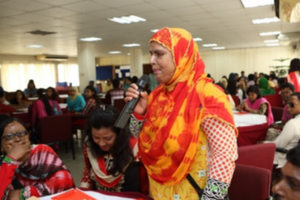
by ASF | Jan 12, 2020 | Survivors Story
Dolly playing a role as Ambassador to protest acid violence
“I am not just a victim of acid attack, I am a woman as well. A man who disrespects a woman, can never be considered as a good human being,” said Suraiya Akhter Dolly from Mymensingh. She had a good family life comprising of six sisters, one brother and her parents. Her father was a farmer. Even after having to fend for such a big family, her father never neglected his children. His daughters were the apple of his eyes and he always referred to them as,” Ma”. Suraiya says,” While studying for long hours, we often used to fall asleep without eating anything. Our father then woke us up and fed us with his own hands.” Dolly used to study in a Madrasa (Islamic school). Often, in class or in the roads, quite a lot of people used to agitate her. Her new relatives also did the same. Dolly was annoyed by this sort of behavior and asked for her family’s help in order to solve this problem. Word spread quickly as a result of which, her agitators scared her more and even threatened to kidnap her. During this mayhem, Dolly was a student of class 8 in the Madrasa. At that time, a teacher’s relative who resided abroad asked for her hand in marriage. Her father was anxious that at the current state, it was possible for anything to happen to his daughter at any time. Out of fear of losing self-respect, he agreed to marry off his daughter. Therefore, in 2005, at the tender age of fourteen, Dolly got married to Monir Uddin. All was well for a few months after her marriage. Nine months later, her husband Monir Uddin returned to Saudi Arabia and came back after three months. At that time, Dolly was pressurized by her husband to bring money from her father and was even told that all her wedding ornaments would be sold off. Dolly even managed to bring some money from her father. But, without taking her permission, her husband sold her wedding jewelry. Later, it was discovered that Monir Uddin has become a drug addict. Her in-laws never raised their voices to protest against the torture that Dolly was being put through. In 2008, with her family’s permission, Dolly divorced Monir Uddin. After the divorce, Monir Uddin regularly threatened her and even told her that he would burn her into complete ashes. On the 1st of September, 2008, which was also Ramadan eve, Monir Uddin threw acid at her face. Dolly was severely affected by this. Water was used to subside her pain and she was taken to the hospital. She was taken to Dhaka Medical College Hospital from Mymensingh Medical College on that very night. She stayed in the hospital for a long time and with the help of her family, she soon regained her health. Her father’s savings were used up in order to pay for her treatment. Later, she came to Acid Survivors Foundation for further checkups. She lost one of her eyes and an ear due to acid violence. Her face, hands, throat and chest were burnt. However, this did not stop her. She said, “I am not a defeated soldier. I need to live a life worth living. I should learn to put aside my moments of frustration and shock in order to learn to dream again. I shall pray for that monster’s punishment and for justice to be served.” on the 9th of September, 2008, Dolly filed a case against Monir Uddin in the Gaforgaon police station. When adequate information was collected, the police took her statement. Dolly said, “I repeatedly received threats to withdraw the case. However, I simply said that the person who commits a crime and a person who tolerates that injustice, are both to be blamed and should be punished equally.” She also said that,” My father was disheartened to see me in such a miserable condition. He often cried by saying that he himself was responsible for ruining my life. This sorrow brought him to his death in 2010.” He was actively involved in Dolly’s case and ensured that every witness involved was brought to court. Dolly also said that the judge was a sensitive person. In 2011, the culprit was granted a life sentence and his bail was set at one lakh taka. Three months after the court’s ruling, the accused was caught and has been held in captivity since then. However, Dolly is yet to receive her money. She hopes for the complete implementation of this case in the hopes that corrupted minds can be corrected so that no one has to suffer from acid attacks. After the court’s decision, Dolly has started her life with new dreams. She was admitted to class 9 and successfully passed her SSC board exams. Alongside that, she works as an ambassador for acid survivors and uses her experience to rearrange the lives of similar victims by encouraging them. By working jointly with the Collective Development Union, she has fulfilled her job of being an ambassador. She is connecting with her brothers and sisters who have suffered from acid violence. By means of group and community meetings, she is trying to ensure that the survivors go back to living their old lives and is also trying to create a positive mindset in society about victims of acid attacks. She is trying to help in everyone’s development and well-being. She serves as an advocate regarding public and private sector support and by ensuring the government’s help. Dolly said that “Every month, we survivors arrange a meeting where we share our sorrows. We can talk freely here and plan for a better life ahead.” She also added, “We will earn our rights, become self-supporting and will be able to stand for ourselves by becoming self-independent. By keeping this vision in mind, we have formed a group of survivors. We hope and aspire to live as fulfilled human beings who are not neglected or looked down on by anyone.”
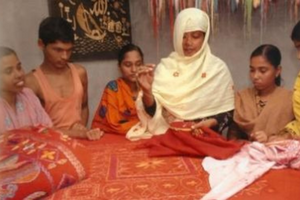
by ASF | Jan 12, 2020 | Survivors Story
“When I want to stand straight holding all power of the earth Suddenly my rebellious mind becomes quiet Half of my soul searches for peace My burnt soul teaches me to taste the new life”
These lines are written by a self-motivated woman who did not stop even after being acid burnt. She is constantly struggling to make many disabled women self-sufficient. Her struggle started to save her soul after being burnt with acid.
In early 1996, at the age of only 14, Shamima, a student of class eight, had to marry a 35 year old man due to family pressure. According to her family, the bridegroom’s age was not a problem as he was a service holder. However, Shamima got frightened with her husband’s extreme sexual desire right from the wedding night and after terrible three days; she came back to her father’s home. She was again sent to in-law’s house, but yet again husband’s company made her scared. Shamima’s in-laws did not consider her mental condition; rather they teased her and said she might have affair. Shamima returned her home again. Rumors were spread in her native village too. In the middle of the tag of war between the two sides, Shamima’s husband threatened her of acid attack for revenge.
It was about 2 o’clock at night on 14 September 1996. Shamima was sleeping beside a window at her father’s house. Suddenly her whole face burnt like fire. After hearing her shouting, neighbors rushed towards her and caught her acid thrower husband red handed from a nearby symmetry. Initially Shamima was brought to Kotchandpur Hospital for instant treatment, and then transferred to Khulna Hospital after 1-hour treatment in Jhinaidah hospital. Her face, eyes, ears, nose, shoulder and hands were burnt with acid. It became more severe for not using water. She was brought home after 7-day treatment at Khulna. As her condition was getting worse day by day, her father somehow collected 80 thousand taka to send her to India for better treatment in 1997. After her return from 1-month’s treatment, she had serious infection in her body. It took much time to get well by local treatment.
Afterwards, Shamima started a new life. She got admitted in class nine and started receiving sewing training. She launched an organization named Oyikko Nari Kallyan Sangstha with 43 deprived women of her village, of whom 25 were physically disabled. They are given training for block, butik and sewing. These activities are carried out through their own society (Somiti). Shamima, president of this Jubo Unnayan Adhidapter affiliated organization, is continuing her studies at Open University side-by-side her official duties. A feature on Shamima’s success was published in Prothom Alo on 17 June 2005. Till then she did not know about ASF. Photographer Shafiqul Alam Kiron, who was with the acid survivors from the beginning, read the feature and went to Shamima’s house at Jhinaidah for publishing her photograph in British American Tobacco’s Calender. He advised her to go to ASF for treatment. After a long time, Shamima took treatment at ASF. Meanwhile she had two surgeries. More operation is needed.
Shamima’s family filed a case after the acid attack. The perpetrator has been sentenced to 43 years imprisonment. He is now at jail. Shamima wants to develop her organization as voluntary organization. She wants to show how to be a protestor and self-reliant to the acid burnts as well as physically disabled women who are left behind helplessly in the society. Shamima’s self-motivated life struggle is an enlightened example to hundreds of acid victim women.
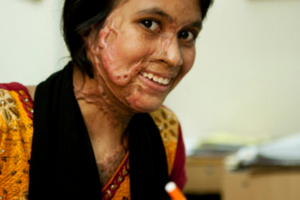
by ASF | Jan 12, 2020 | Survivors Story
Shamima Akter a person with creativity
Shamima Akter was born and raised in Naogaon, where she currently lives with her parents and four sisters in their neighborhood, Potnitala. Currently 19 years old, she was attacked with acid by her husband in 2011 over a dispute over whether or not Shamima would continue her studies as a married woman. Shamima’s devotion to her education was cause for contention with her husband, Shohidul, who would often even resort to violent means to persuade her to give up on her academic ambitions. Shamima, however, was determined to pursue her dream of joining the armed forces and the Border Guard Bangladesh (BGB) Camp. She refused to quit her studies on his behest and would suffer daily abuses, like beatings and verbal abuse. After repeatedly borrowing money from Shamima’s parents, Shohidul decided to retaliate at his wife and in laws by absconding with a large loan from them In the middle of the evening on May 25th 2012, Shamima woke up to find her husband sneaking out of the house, and to find that her face was quickly eroding off her skull. She ran to the bathroom and saw that her skin was falling off her face and that she was burning everywhere. Shamima’s mother bathed her wounds continuous with water in the hopes that the burning sensation would cool down. Shamima was brought to ASF on the day of her attack with 11% burn mostly affecting her forehead, face, eyes, nose, neck, right ear and left side of chest and both hands. She received four operations and was at the organization for two and a half months. However, undeterred by her husband’s acts, just 15 days after her attack Shamima went back to Potnitala to take her intermediate exams. As a result of the treatment she received at ASF hospital, Shamima’s vision was saved, her hearing was restored and she can function without the aid the support of a hearing aid, and lesion on face and neck were healed without major scar and contracture. Shamima still has post burn contracture on her neck and lower part of her chin and visible scar on her face for which she will require more surgical interventions in the next few years. The day after the attack, Shamima’s father filed a case against Shohidul at the Pitnitala Police Station, where the local police paid no heed to his complaints. The day after, Shamima was taken to a local hospital in Fakshahi to receive intensive treatment. Looking to BRAC for aid, Shamima’s father filed a complaint with the legal department at BRAC on behalf of Shamima and the misconduct and neglect of her case at Potnitala Police Station. BRAC accompanied Shamima’s family to petition the village Chairman and the District Commissioner’s office to get her case filed. As a result, the officer in charge at Potnitala Police Station was reprimanded and punished for neglecting his oversight duties to Shamima’s case. 15 days later Shohidul was caught in Uttara, Dhaka. Later he was let out on bail. Investigations into the case yielded many points of illumination: Shohidul was in touch with one of Shamima’s neighbors to collect surveillance information while he was away on Shamima and her whereabouts. He also arranged to steal Shamima’s cell phone; he bought the acid he used on Shamima from a gold jeweler. His crime represents one of cold-hearted calculation and foresight; no crime of passion, Shamima’s husband deliberately and methodically planned to ruin her life by leaving her horribly disfigured. As Shamima continues with treatment and rehabilitation, she struggles with trying to remember that her attacker is behind bars; the scars he left behind, however, is a constant reminder of the threat and damage he represents. Nowadays, Shamima has taken to artistic pursuits to help her recover her sense of self and agency—always singing, dancing, and writing poems, Shamima is a creative person who’s talents have not been stifled by the trauma she has endured.


